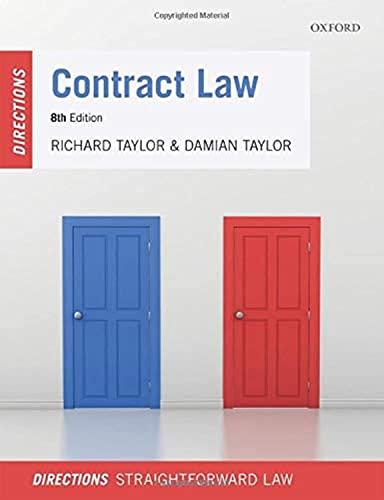Question
True or False Instruction: Write true if the statement is correct and write False if the statement is not correct. 1. Distributive justice is when
True or False
Instruction: Write true if the statement is correct and write False if the statement is not correct.
1. Distributive justice is when rewards and responsibilities are distributed among society's members in a fair and just manner.
2. According to Aristotle the way in which the major social institution distributes fundamental rights and duties.
3. According to Plato, injustice is simply inequalities that are not to the benefit of all.
4. According to Campbell, inequalities in society in the assignment of rules and positions, can be allowed as long as it does not harm the least advantaged.
5. According to Nagel, human dignity is invisible because it is essentially at the very core of our humanity.
6. Individual should be treated the same, unless they differ in ways that are relevant to the situation.
7. Retributive justice is the degree to which sentences are fair and just.
8. John Rawls pointed out that the unity of a community depends the degree to which its members believe they are being treated fairly.
9. Rawls stated that issues and institution in matter efficient and well-arranged must be reformed or abolished.
10. Justice is an expression of our shared acceptance of each other's fundamental integrity.
11. We must treat each other as equals if we are to live together in an interdependent culture.
12. A Theory of Justice is a book of John Rawls.
194
13. Social Justice and Social Institution was written by H. Bedau.
14. According to Nagel distributive justice are only pertinent where there are shared institutions.
15. According to Aristotle most basic principle of justice is that equals should be treated equally and unequal should be treated unequally
16. According to Immanuel Kant human beings should have the same dignity and be treated equally.
17. God's justice means that we value the lives of others just we value our lives.
18. God gave us intellect to be able to come up with good judgements and responsible decisions.
19. Mill understood rights are valid claim on society and are justified by utility.
20. Part of the fundamental center of morality is called justice.
21. The ability to make decisions that are not overly universal but concrete and unique to a particular situation is fairness.
22. Nowadays justice and fairness are sometimes used interchangeably.
23. The principle of justice was universally accepted more than 2,000 years.
24. The ability to decide without regard to one's interest is fairness.
25. Men and women are created equal in the eyes of God.
26. According to Vasquez justice denies that the loss of freedom of some is made right by a greater well shared others.
27. Andre said that justice does not allow that the sacrifice imposed on a four are overweighed by the larger sum of advantage enjoyed by many.
28. Shanks argued that there is a conflict of interests since persons are not indifferent.
29. Meyer said that the greatest happiness for the greatest numbers suffers from misjudging individual preferences.
30. God gave men the moral insight of fairness and respect others.
Step by Step Solution
There are 3 Steps involved in it
Step: 1

Get Instant Access to Expert-Tailored Solutions
See step-by-step solutions with expert insights and AI powered tools for academic success
Step: 2

Step: 3

Ace Your Homework with AI
Get the answers you need in no time with our AI-driven, step-by-step assistance
Get Started


